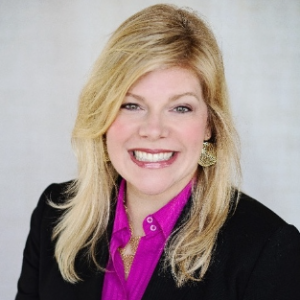
Are your events accessible to people with disabilities? Whether an event is for prospective students, current students, alumni, donors, faculty, staff, or the institution's broader community, it's our ethical and legal obligation to ensure each and every event is inclusive for all—including the approximately 20% of post-secondary students that have a diagnosed disability. Plus, while accessibilityis necessary for some, it benefits all.
"But what do we need to do to ensure our events are accessible?" is a question we frequently get. To answer this question and more, I sat down with Stephen Cutchins, Cvent’s Senior Manager of Accessibility. Read the Q&A below as Stephen responds to
the most frequently asked questions from colleges and universities.
Question: Stephen, it's clear to anyone who hears you speak that you are passionate about accessibility. Why?
Answer: Accessibility is very close to my heart. My mother lost her leg to cancer when I was seven. I spent my summers with my aunt and uncle. Two of their children, my cousins, had Cerebral Palsy and were in wheelchairs. I have Tourette Syndrome, which for me results in uncontrollable tics and twitches. So, I have first-hand experience with the challenges people with disabilities can experience navigating seemingly simple tasks like opening a door, navigating campus buildings, and participating in events.
Question: Would you start by talking about the kinds of disabilities event planners need to keep in mind to make the event accessible to students, faculty, alumni, and donor attendees?
Answer: Yes, that's a great place to start, as many talk about disability as a singular condition when, in actuality, the term represents a wide array of people with a variety of needs. For example, think about the prospective student who has tremors and has difficulty using a mouse, the student who suffers from anxiety, the professor whose speech is impacted from having had a stroke, the major donor who has hearing loss and struggles to catch every word that’s said.
A disability is a condition of the body or mind that makes it more difficult to do certain activities and interact with others. A disability can affect vision, movement, thinking, remembering, learning, communicating, hearing, mental health, or social relationships. While blindness, deafness, and wheelchair use often come to mind when thinking about disabilities, it's essential to recognize that disabilities can take many different forms, including those that are not visually obvious.
Question: How do I appropriately plan to accommodate students with a disability, given I cannot ask if they have a disability?
Answer: This is a great question as we’re often great at asking about dietary restrictions, but rarely do I see questions about accessibility needs. We event planners just need to know what questions to ask. While we can't ask students directly about disabilities, we can ask what accommodations they might need. For example, we cannot ask if a student is deaf, but we can ask if they need captions, a sign language interpreter, or an audio description. We can ask if a personal care assistant will accompany them, if they use a service animal, and if they use a mobility device.
In my experience, students generally respond positively to these kinds of questions because it communicates that you're tuned into their unique needs and that you care about their experience.
Question: What should education event planners look for in a software platform to know if it's accessible? What steps has Cvent taken to ensure our technology is accessible?
Answer: For the most part, software products like ours need to be natively accessible. From design to development, accessibility has to be baked into the software development lifecycle. From a Cvent standpoint, we test our products to ensure they work for keyboard-only users and with assistive technologies such as screen readers and Braille displays. We develop our products to Web Content Accessibility Guidelines (WCAG) 2.2 AA, the latest version.
To ensure that we are fully transparent and honest concerning our level of accessibility, we have an independent third-party accessibility firm test our products, report any defects, and document their findings in Voluntary Product Accessibility Templates (VPATs). We have VPATs for the following products, with new products being added every few months: Event Website and Registration, Attendee Hub Web and app, Event Diagramming, OnArrival, Meeting Request Form and Access Portal, Webinar, Speaker Resource Center, Survey, and Passkey Booking and Block Request. From what I can find, we are the only events software company that has VPATs created this way, something I am very proud of.
That said, our commitment to accessibility goes beyond just meeting the WCAG Guidelines. We actively design and develop the features within Cvent to help ensure content is accessible. For example, when adding an image to the summary page of a Cvent registration site, we require the event designer to fill out the alt text field, the text a screen reader uses to describe the image to a visually impaired reader. When choosing colors in Attendee Hub, notifications pop up if the selected colors don't meet accessibility guidelines.
Question: You talked about event registration in a previous question. When planners create event websites in Cvent, what are the top 3 items they must do to make them accessible?
Answer: There are a few things that planners need to do when creating event websites in Cvent. By far, the top 3 things you should do are:
- Add proper alt text to images,
- Make sure correct color contrast ratios are met (usually 4.5:1), and
- Maintain correct heading structure.
The good news is that we try to make this as easy as possible. For example, when creating a site in Attendee Hub Site Designer, we monitor colors and alert planners if the ones they choose do not meet proper guidelines. If safe color mode is enabled then we even modify colors for them, for example by making a red slightly darker, so there is nothing a planner needs to do.
Question: Any final comments you'd like to share with our readers?
Answer: Yes. We have articles coming to our Cvent Knowledge Base soon, so please check back.
Here are a few resources you may find helpful:
- WCAG Standards - https://www.w3.org/WAI/standards-guidelines/wcag/
- Guidance:
- Alt text: https://webaim.org/techniques/alttext/
- Color contrast: https://webaim.org/articles/contrast/
- Headings: https://webaim.org/techniques/semanticstructure/#headings
- Helpful contrast checker tool - https://accessibleweb.com/color-contrast-checker/










